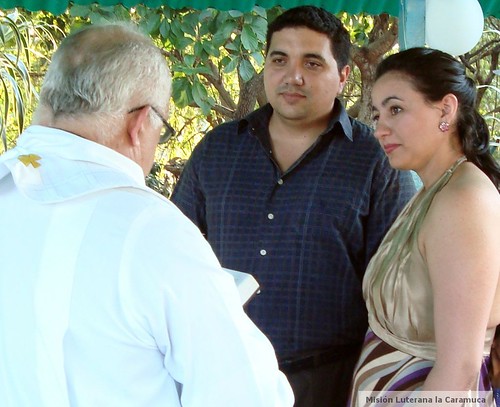
Depending on how you look at it, we closed the old year or began the new year with a reaffirmation of wedding vows. Luz Maria's daughter, Wuendy, and her husband, Jesus Mogollon, renewed their marital commitment at our New Year's Eve service, December 31, 2010.
Although they have been married since 2007, Wuendy and Jesus sought our prayers and God's blessing as they take another big step in their life together. They will move to Quebec, Canada, in March. Jesus is a software engineer who got in on the ground floor of a startup company that since has become quite successful. The entire company, all of its employees and their families, will move from Caracas to Montreal to take advantage of business opportunities up north.
One might wonder, what do Venezuela and Canada have in common? For one thing, petroleum production in both countries. Jesus' company specializes in the development of automated processing software, the programs which control the petroleum refining and other highly automated industrial processes.
Wuendy and Jesus have been diligently learning French as a prerequisite for moving to Quebec. Luz Maria and I hope this will prove useful in finding a Lutheran congregation in Quebec, We don't know about any Latino outreach in Quebec by the Lutheran Church - Canada (Eglise Lutherienne du Canada), although we know the LCC has devoted a great deal of its resources to international mission work in Nicaragua. Also at least two Lutheran missionaries to Venezuela have been Canadian: Edmund Mielke, who is now pastor of Grace Lutheran Church, Brandon, Manitoba, and Ontario native Ted Krey, who is now Lutheran Church - Missouri Synod regional director of missions for Latin America and the Caribbean. Pastors Mielke and Krey both spent a lot of time in Barinas, which is why the cross we have above our altar at La Caramuca Lutheran Mission is modeled after the official symbol of the Lutheran Church - Canada.
However, there are a number of French-speaking congregations in Quebec affiliated with the LCC. Lutheranism is not new to the province, according to David Somers, an LCC pastor in Montreal who was instrumental in the development of the new hymnal. Many early immigrants from France were Lutheran, escaping the Wars of Religion that pitted Protestants against Roman Catholics.
In November 2009, the LCC published Liturgies et cantiques lutheriens, the first complete French Lutheran hymnal in 35 years. Liturgies et cantiques luthériens includes 434 hymns, including never-before-published material from the Alsace-Lorraine region of France, three settings of the Divine Service, Matins, Vespers, and Compline, Holy Baptism, marriage, and funeral services among many other liturgical resources.
More than 2,500 copies of the French hymnal are now in circulation and are used in Africa, Europe and Haiti, as well as Canada. There are growing numbers of Lutherans in French-speaking Africa, especially in Madagascar.
We can only hope that one day we will have a Spanish hymnal that surpasses Culto Cristiano, first published in 1964. Culto Cristiano contains 476 hymns, all the propers based on the historic one-year lectionary, orders of public and private confession, the Divine Service, Matins, Vespers, the Psalms, prayers for various occasions, the Small Catechism, and special orders of service for weddings, funerals and other events. However, it does not contain orders for some of the liturgical practices that have been revived in the last 45 years, such as imposition of ashes on Ash Wednesday and the Good Friday tenebrae service, and some practices that are typical here in Venezuela, such as the blessing of a new house. Of course, we do have a supplement, Ritual Cristiano, that covers the blessing of a new house, and even such things at the dedication of a cemetery or a baptismal font, but it would be nice to have all these things in one volume. Culto Cristiano also does not contain a number of excellent songs that we have found useful in teaching children and young people, such as "Alabare, alabare", "Padre Nuestro" (a metrical version of the Lord's Prayer), "Creo en Dios el Padre Eterno" (the Apostle's Creed set to music), "Dios es nuestro amparo" and others.
The reaffirmation and blessing of the marriage of Wuendy and Jesus was an opportunity to just what marriage is in God's eyes. What it is not: A private contract between two individuals for their personal pleasure, no matter how mutual the satisfaction might be. If it were, it might not matter if both partners were of the same sex, or how many partners a person might have. However, marriage is the most public institutions, instituted by God in the beginning as part of His order of creation. Because God also instituted civil government to restrain immorality, the administration of laws upholding the sanctity of marriage and family fall within the domain of secular authorities. Those who do not respect what God has ordained regarding marriage are rightly subject to punishment by the state and by God. Furthermore, a government which fails to conform the civil law to the divine law invites the judgment and wrath of God upon the entire nation.
Our New Year's Eve service also provided the opportunity to reaffirm the importance of placing all your plans in God's hands. Because of Christ's atoning suffering and death, those who believe are restored to a right relationship with God. Thus we may pray to Him with confidence, trusting that He intends for us "a future and a hope" (Jeremiah 29:11) and that "all things work for the good of them that love God, for those who are called according to His purpose" (Romans 8:28). Above all else, we have the promise in baptism that, no matter what happens to us in life, we are assured of eternal happiness with Christ in the life to come. Amen.


No comments:
Post a Comment